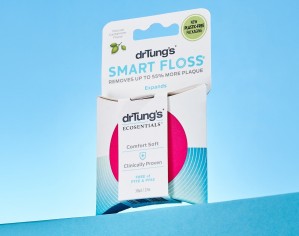Your cart
There are no more items in your cart
Keep Flossing: It Isn't If You Should Floss, It's How You Floss
 Recently, the Associated Press reported that due to lack of research, flossing isn't necessary and therefore had been removed from federal government dietary guidelines as of last year. However, a lack of research does not equate to the effectiveness of flossing. Flossing is difficult to study per federal regulations as they require evidence be obtained via strict clinical trials. Such trials have quite rigorous requirements, and they quickly become very costly. They must have a control group, and they must also be single- or double-blind, over a substantial period of time. Furthermore, in the case of flossing, there are also ethical implications the investigator would have in telling subjects not to floss for a period of time despite having buildup between teeth. So there is health risk or cost these subjects could suffer from not taking care of their teeth and gums. Little wonder then that they weren't able to find a substantial body of flossing research that met these guidelines. The question, then, shouldn't be whether or not to floss, but instead should be how to floss effectively. Asking the question “is flossing effective” is just like asking if brushing your teeth is effective – are you doing it correctly and with an effective toothbrush? Brushing versus flossing – Brushing only covers about 65% of teeth surface area. In order to disrupt plaque and debris buildup from in between teeth, an interdental tool, such as floss, must be used to clean the remaining 35% of teeth surface area. The effects of not removing all such debris can be quite harmful to teeth and gums down the road. Poor gum health also can lead to a myriad of other systemic diseases in the body.
Recently, the Associated Press reported that due to lack of research, flossing isn't necessary and therefore had been removed from federal government dietary guidelines as of last year. However, a lack of research does not equate to the effectiveness of flossing. Flossing is difficult to study per federal regulations as they require evidence be obtained via strict clinical trials. Such trials have quite rigorous requirements, and they quickly become very costly. They must have a control group, and they must also be single- or double-blind, over a substantial period of time. Furthermore, in the case of flossing, there are also ethical implications the investigator would have in telling subjects not to floss for a period of time despite having buildup between teeth. So there is health risk or cost these subjects could suffer from not taking care of their teeth and gums. Little wonder then that they weren't able to find a substantial body of flossing research that met these guidelines. The question, then, shouldn't be whether or not to floss, but instead should be how to floss effectively. Asking the question “is flossing effective” is just like asking if brushing your teeth is effective – are you doing it correctly and with an effective toothbrush? Brushing versus flossing – Brushing only covers about 65% of teeth surface area. In order to disrupt plaque and debris buildup from in between teeth, an interdental tool, such as floss, must be used to clean the remaining 35% of teeth surface area. The effects of not removing all such debris can be quite harmful to teeth and gums down the road. Poor gum health also can lead to a myriad of other systemic diseases in the body.
Moreover, from the state of one's oral health, it is easily recognizable if corners are being cut. Dr. Iofolla, a dentist and public health analyst at the National Institutes of Health, says "As a dentist, I have no hesitation still telling my patients to floss. Dentists can tell immediately, looking at a patient's mouth, whether they floss or not.”



By Fabey Dental Studios 09/9/2016 12:51:16
Very popular topic for dental hygiene. Flossing is one of the basic and most important parts of dental health. It also depends on some factors like: how often we floss?, do we floss before or after brushing? And how do we floss?. These things we should keep in mind.